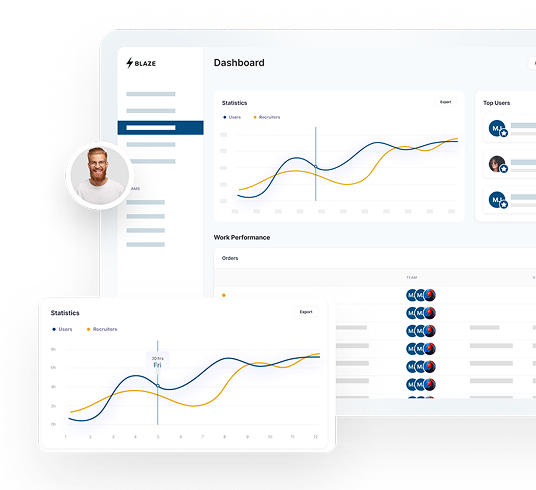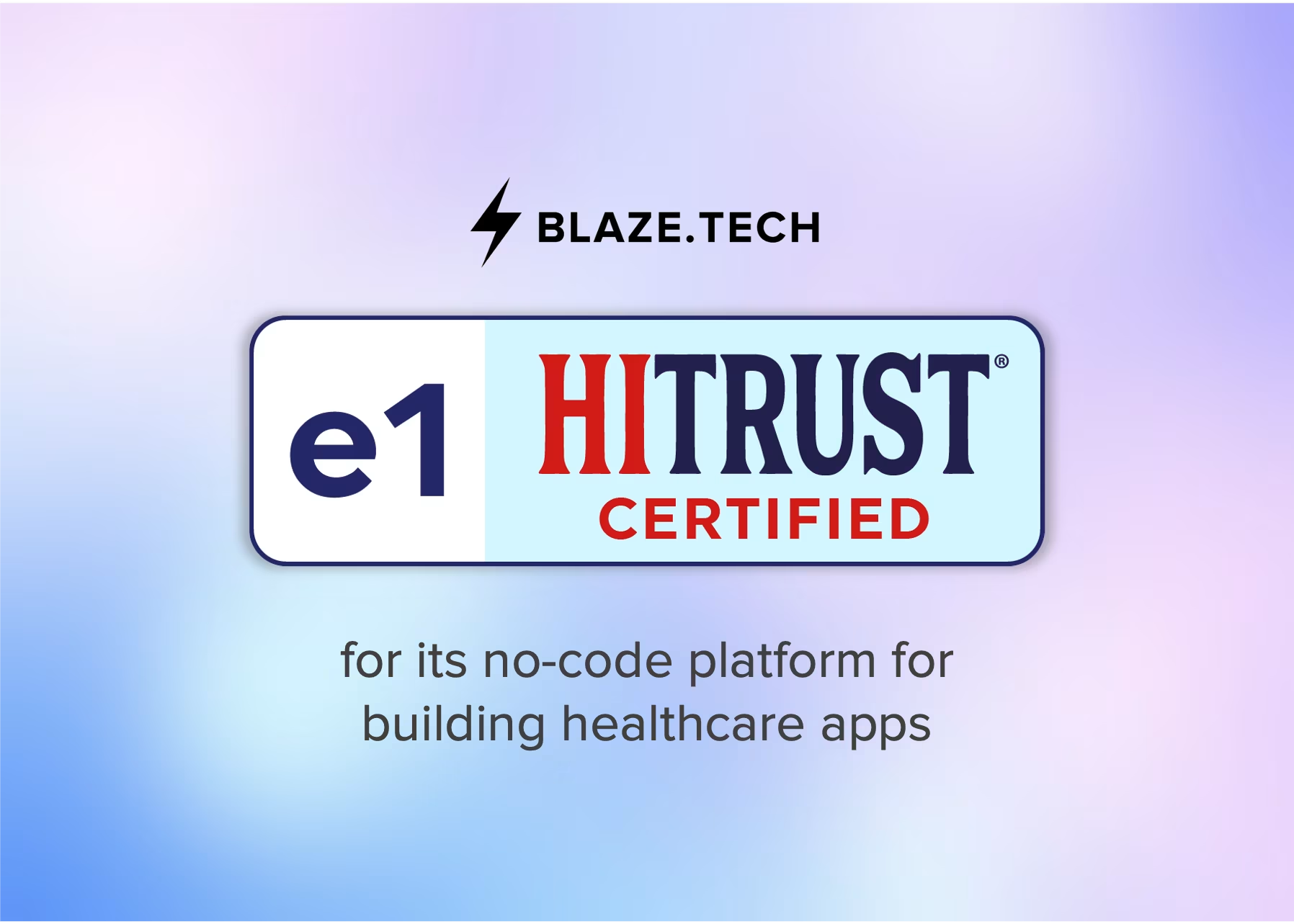Table of contents
Best EHR for Small Mental Health Practices & Providers in 2026

Written by
Blaze Team

Reviewed by
Nanxi Liu
Expert Verified
Small mental health therapy practices often operate with limited budgets, lean administrative support, and detailed clinical documentation requirements. Unfortunately, many standard Electronic Health Record (EHR) systems are overly rigid or complicated. This makes them a poor fit for small practices operating in limited environments.
While the EHR for any clinic must be HIPAA-compliant, smaller mental health practices should adopt one that supports tailored workflows, connects with other tools, and doesn’t require oversight from a large team. Read on to learn more about:
- EHR features that small clinics need and challenges they face with traditional EHRs
- Common challenges that traditional EHRs pose to smaller clinics
- Features to support better care, documentation, and growth
- Reasons why most EHRs don’t work for small practitioners
- Why no-code platforms are ideal for small teams
Let’s discuss what small practices specifically need in an EHR.
What Small Mental Health Practices Need in an EHR
For small and solo mental health practices, the ideal EHR should simplify both clinical and administrative workflows while staying within budget. The best EHR for smaller behavioral health practices should include the following:
- HIPAA compliance: EHR for mental health for any health practice, large or small, must be HIPAA-compliant. Built-in compliance features ensure that sensitive patient health data is kept safe.
- Scheduling and client profile management: An effective EHR should simplify booking and create detailed client profiles. Having everything accessible from a single, centralized platform reduces administrative pain points and minimizes scheduling errors.
- Clinical documentation and progress notes: Mental health professionals require tools that support session documentation. The best EHRs include customizable templates, one-click SOAP or DAP notes, and auto-fill options for repeat clients.
- Integrations with pre-existing healthcare software: An EHR should connect with the tools many small practices already rely on, like Google Workspace, QuickBooks, and others. These integrations reduce double entry and help you avoid toggling between platforms.
Choosing the right EHR involves finding a system that supports the way your practice truly works. This means prioritizing customization, ease of use, and time-saving features that reduce administrative burden.
Common Challenges with EHRs in Small Practices
Many EHRs are complex and bloated with features irrelevant to solo practitioners or small teams. Here are some common challenges small practices face when adopting an EHR:
- Tools designed for hospital-sized organizations: Many EHRs on the market are initially intended for enterprise health systems, not solo practitioners or small behavioral health teams.
- Expensive implementations or per-seat fees: Cost is a major barrier for those exploring EHRs for mental health private practices. Many platforms charge high setup fees, ongoing per-user costs, or add-on modules for features that should be included.
- Workflows aren’t tailored for therapy-based care: Therapy-driven care has specific documentation and scheduling needs. Unfortunately, general medical EHRs aren’t built to support these needs.
- Scheduling, billing, and communication limitations: Small mental health teams handle everything from client bookings to insurance claims — often without a dedicated administrative department.
These challenges highlight a disconnect between what small practices need and what most mainstream EHRs provide. Small mental health teams require platforms tailored to their specific workflows, budgets, and care models.
EHR Features That Matter to Small Practices
When selecting the best EHR for a small mental health practice, the focus should be on HIPAA-compliant features that support customization, patient communication, and simplified booking. Here are the crucial features that you should include in your small practice EHR:
HIPAA Compliance + User Role Controls
First and foremost, your EHR must meet HIPAA standards with encrypted storage, audit trails, and secure access. However, it should also include role-based controls, allowing clinicians, front desk staff, and billers to view only the information they need.
Your staff can manage permissions to protect private health information (PHI) while staying productive. These controls are key for compliance. The right EHR combines simplicity with security, letting you scale confidently while minimizing risk and ensuring client trust.
Session Notes and Progress Tracking
EHRs designed for mental health private practices should offer tools that facilitate quick and clinically useful documentation of sessions. Customizable note templates, like SOAP, DAP, or your own framework, help you monitor treatment outcomes with ease.
Use auto-fill, goal-tracking, and past records access to stay focused and flowing. These tools maintain care continuity. They also simplify audits, supervision, and insurance compliance.
Customizable Treatment Plans
Treatment plans need to be customized for each patient’s individual needs, and your EHR should support this. The best EHR for private practice enables you to tailor treatment to individual diagnoses, clinical goals, and therapy styles.
The best mental health EHR should also support CBT (cognitive behavioral therapy), DBT (dialectical behavior therapy), or eclectic approaches. Those that do so will offer customizable templates to ensure they align with your method. Progress updates, revisions, and measurable objectives should be easy to log and review.
Scheduling and Calendar Management
EHRs with integrated scheduling let you book sessions, block availability, and send automatic reminders, all from one dashboard. Syncing with tools like Google Calendar or iCal helps reduce double-bookings and no-shows.
Look for color-coded calendars, recurring appointment options, and filters for clinician, location, or service type. This visibility keeps small teams aligned and lets solo providers focus on sessions, not logistics. A built-in calendar also enables clients to self-schedule or confirm appointments through a client portal.
Secure Messaging With Patients
Secure messaging built into your EHR ensures HIPAA-compliant interactions between sessions. You can share forms, updates, or appointment reminders without relying on email or text, keeping everything centralized and confidential.
Some platforms even offer message templates for check-ins, confirmations, or post-session notes. For small teams or solo providers, having encrypted, logged communication within the client record reduces administrative burden and improves responsiveness.
Outcome Reporting Tools
Ultimately, a small mental health practice EHR should simplify reporting. Built-in outcome tools help you visualize client progress through goal tracking, assessment scores, and symptom changes over time.
Custom reports can pull trends from session notes or treatment plans to support data-driven decisions. These insights are especially valuable when communicating with payers or collaborating across teams.
Billing, Insurance, and Claims Tracking
Manual billing is one of the biggest pain points in private practice. A strong EHR automates several steps, including invoicing, insurance claims, and superbill generation. It should include built-in eligibility checks and client payment tracking.
With tools to flag unpaid invoices or claim rejections, you can stay on top of revenue without hiring a billing service.
Basic Analytics Dashboards for Admins
Basic analytics dashboards help track session volume, billing trends, no-show rates, and provider utilization. These snapshots give you an accurate pulse on performance.
The best EHR for a mental health private practice should surface actionable insights without requiring a data analyst. From filtering by date range to exporting for reports, these tools amplify smarter decision-making.
Why Most EHRs Don’t Work for Small Mental Health Practices
Popular EHR platforms, such as TheraNest, SimplePractice, and Valant, often fall short for small mental health practices because they can lock users into inflexible workflows. Here are 3 critical constraints small mental health practices frequently encounter with traditional EHR systems:
- You can’t easily customize features or forms: Many mental health EHR systems come with rigid, predefined templates for clinical notes, assessments, and intake forms. Onboarding can become frustrating for practices with specific documentation needs.
- You may pay for features you don’t need: Many EHR platforms bundle their features into tiered pricing plans, which means small or solo practices often end up paying for tools they’ll never use. For example, a counselor who doesn’t need e-prescribing or group scheduling may still have to purchase a premium package that includes them.
- Integrations or changes take time: Even simple updates, like connecting your EHR to a billing app, can become time-consuming and expensive. Many platforms lack user-friendly integration tools or API access, pushing you to submit support tickets for every change.
These EHR limitations reduce your clinic’s productivity. They also affect care quality. Instead of adapting to your workflow, most EHRs expect you to adapt to theirs.
Why Blaze Is a Great Fit for Growing Clinics
Blaze, a no-code platform, allows you to build a customized EHR system tailored to the unique workflows of your mental health practice — whether it be a solo practice or a team of over 20.
You won’t need to worry about premade software that doesn’t fit your needs. With its intuitive drag-and-drop builder and ready-to-use components, you can create and manage your own EHR system or healthcare app without a developer. The platform enables easy design of custom forms and workflows that align with widely used formats, such as SOAP and DAP.
Blaze also offers many integrations. For instance, you can connect with payment platforms, pre-existing databases like MySQL and Airtable, and security apps like Auth0.
Blaze is fully HIPAA-compliant and built with enterprise-grade security to safeguard sensitive patient data. Their dedicated support team helps ensure a headache-free setup and ongoing operation of your mental health EHR.
Example Use Case: How A Growing Clinic Could Build Its Own EHR with Blaze
Let’s say a small mental health clinic struggles with a legacy EHR — disconnected tools, fragmented workflows, and no reliable reporting. Intake is handled through PDFs, progress notes written in Word, and billing done through a separate system.
That kind of setup often slows onboarding and creates workflow bottlenecks.
Using Blaze, a clinic like this could build a HIPAA-compliant, customized EHR in just a few weeks. The new system can unify intake, charting, and billing in one streamlined platform, tailored to the clinic’s specific needs.
What the Workflow Could Look Like
With a setup like this, new clients can be onboarded in minutes, not days. Custom templates would make progress charting faster and more consistent. A centralized dashboard can help reduce administrative bottlenecks and give staff more visibility into operations.
By saving time on routine tasks, the admin team could shift focus toward marketing and outreach — potentially bringing in more patients. A custom EHR like this would not only simplify operations but also create a better experience for current clients while making the clinic more attractive to new ones.
Choosing the Right EHR for Your Clinic
Selecting the right therapy EHR is crucial for delivering adequate behavioral healthcare and reducing administrative burdens. Many fall short when it comes to addressing the unique workflows of solo therapists and small practices.
Prioritize systems that offer therapy-specific features, customizable workflows, and seamless documentation tools. Here are key guidelines to follow:
- Demand HIPAA compliance: Protecting client confidentiality is non-negotiable. Your chosen EHR must be fully HIPAA-compliant and designed to secure sensitive patient information.
- Identify your core needs: Whether you're managing solo or group sessions, telehealth, patient portals, or scheduling, understanding your workflow pain points will help you find a platform that addresses them effectively.
- Support for notes: Opt for platforms that support SOAP, DAP, or other note formats, ensuring compatibility with your clinical and billing processes.
- User-friendliness matters: Evaluate how easy the system is to learn, implement, and navigate. Smooth onboarding and reliable customer support can minimize downtime and disruptions.
We recommend testing at least 3 platforms before selecting one for your clinic. Also, take your team’s feedback into consideration, as they’ll use the system too.
Frequently Asked Questions
What Is the Best EHR for a Solo Therapist or Small Practice?
The best EHR for solo therapists or small practices is one that offers HIPAA compliance, customizable workflows, integrations, and built-in telehealth. It should simplify documentation and billing without overwhelming you with unnecessary features.
No-code platforms like Blaze are ideal: They’re flexible, user-friendly, and tailored specifically for therapy-based care, unlike hospital-focused EHRs that are often rigid.
How Much Does a Mental Health EHR Usually Cost?
Most platforms charge monthly fees per user, typically ranging from $100 to several $1,000s per month.
Some platforms cost more because they rely on custom development or third-party add-ons. No-code platforms like Blaze reduce long-term costs by eliminating the need for developers or expensive add-ons.
Can I Customize My EHR Without a Developer?
Yes. With no-code platforms like Blaze, you can fully customize your EHR without writing a single line of code. These offer drag-and-drop tools to build intake forms, customizable templates, workflows, and client portals tailored to your practice.
Custom Build the EHR Your Mental Health Practice Needs
Blaze offers a smarter, more flexible solution than outdated, one-size-fits-all software. Here’s why Blaze stands out as the best EHR for small mental health practice needs:
- No-code customization: Blaze lets you build an EHR that fits your workflows — without writing a single line of code.
- HIPAA-compliant and secure: Blaze is fully HIPAA-compliant and includes enterprise-grade security like 2FA, SSO, and role-based permissions.
- Hands-on support: Blaze’s implementation team provides guidance from setup through launch.
Discover why Blaze is an optimal EHR software for small mental health private practices. Schedule a demo today.
The Secure No-Code & AI Platform
Supercharge your team's operations and performance with better apps and tools.
Create custom apps fast
Secure & HIPAA compliant
Streamline complex workflows

The Secure No-Code Platform
Build apps with best-in-class security.


